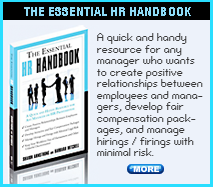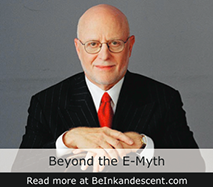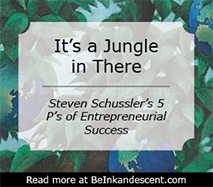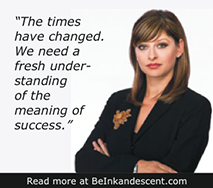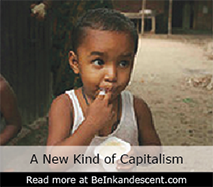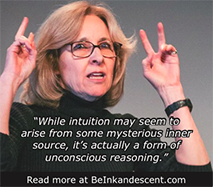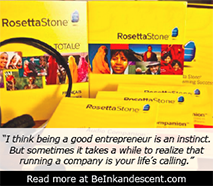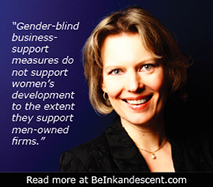
What is Conscious Capitalism? For the full story, we went straight to the source: Raj Sisodia, a founding member of the Conscious Capitalism movement.
He is also the chairman of the Conscious Capitalism Institute, and the co-author of the bestselling book he wrote with Whole Foods CEO John Mackey, “Conscious Capitalism: Liberating the Heroic Spirit of Business,” which was published in 2013 by Harvard Business Review Press—and is the cover story for our April 2013 issue of Be Inkandescent magazine.
A professor of Marketing at Bentley University, Sisodia has also published seven books and more than 100 academic articles. His work has been featured in The Wall Street Journal, The New York Times, Fortune, Financial Times, The Washington Post, The Boston Globe, and on CNBC.
He has been honored with numerous awards as well; he is one of the “50 Leading Marketing Thinkers” and has been named to the “Guru Gallery” by the Chartered Institute of Marketing. Bentley University honored him with the Award for Excellence in Scholarship in 2007 and the Innovation in Teaching Award in 2008. He was named one of the “10 Outstanding Trailblazers of 2010” by Good Business International, and one of the “Top 100 Thought Leaders in Trustworthy Business Behavior” by Trust Across America for 2010 and 2011.
So we are very happy to talk with Sisodia about this growing movement, which USA Today featured on its front page on March 26 in an article by Bruce Horovitz entitled: Millenialls Spur Capitalism With a Conscience, which explains that Millennials are demanding capitalism with a conscience, and how some of America’s biggest brands are delivering.
• Scroll down for our Q&A with the man behind the movement.
• Click here to listen to our entire podcast interview on the Inkandescent Radio Network.

Inkandescent: Raj, let’s start with the essential question—what is Conscious Capitalism?
Raj Sisodia: Conscious Capitalism is a different way of thinking about business. Whether you own or manage a business, whether you are a citizen or observer of business, there is an attitude that has been out there about what is business and what is capitalism for 150 years or so.
That attitude, which has been quite corrosive and damaging, was created by outsiders and critics. Economists and Marxists actually defined the terms of what businesses are supposedly about: maximizing profits and serving shareholders—other stakeholders are just a means to that end. That narrow, self-serving narrative became the dominant paradigm; that is what we are taught in economics and then in business schools. In reality, business is not about that.
Inkandescent: We couldn’t agree more. So tell us, what do you think business is, and should be, about?
Raj Sisodia: As many of your listeners know, business is about doing something that you have a passion for. It is meeting the needs, real needs, of people. It is about providing a means of elevating your existence beyond a base level.
Look at the impact of capitalism. Up until the past 200 years, the average person earned between $400 and $600 per year worldwide for thousands of years. Income really started rising around the year 1800, and now we have reached close to $9,000 per person in real terms.
Ninety percent of people used to live on less than a dollar a day. That is now down to about 15 percent. We used to live 30 years on average and now we live about 68 years worldwide. Illiteracy rates have plummeted, and many other indicators of our well-being are way higher than they used to be. A lot of that is because of capitalism. That is one part of the story.
The second part is that once we become conscious of what business and capitalism are really about and what they can do, we can amplify the positive impact of businesses to a much higher level. We can actually negate some of the negative side-effects of what we have built. It doesn’t have to be that businesses can only prosper and make money if they damage the environment, which has a negative impact on people’s health and causes a lot of stress. None of that has to be the case. Business can be done in the spectrum of positive side-effects, including great financial components.

Inkandescent: So Conscious Capitalism is the philosophy that business has a higher purpose that goes beyond profit, the reason why it exists.
Raj Sisodia: Right. And we have to think of all of the stakeholders as important in their own right, not just a means to an end of making money. We have to create value for all of them.
Also, we need leaders who are driven by purpose, service, and the caring that they feel for their stakeholders—not just by power and personal enrichment.
And lastly, businesses have unique cultures that are based on trust, caring, transparency, authenticity, and integrity that allow them to continue to operate in this way even though the context around them might change. That is Conscious Capitalism in a nutshell.
Inkandescent: How did you meet John Mackey, and what inspired you to write this book together?
Raj Sisodia: I met John because of one of my earlier books, “Firms of Endearment: How World-Class Companies Profit From Passion and Purpose.” In that book, which was published in 2007, we featured 28 companies, 18 public and 10 private, that were loved by all of their stakeholders: customers, supplies, communities, and investors. We set out to understand what is it that makes that happen.
We found essentially the principles of what I just outlined. These companies do have something distinct and unique about them, which is their purpose. They have different kinds of leaders and they do care about their stakeholders and so on. Whole Foods was one of the companies we featured, though we had not actually interviewed John because he did not grant interviews to book authors then.
The book was in a draft form and my coauthor happened to be on an airplane talking to someone next to him about the book. She is a friend of John Mackey’s and she said he would really like it. We emailed her the document, John actually read it, and he got back to us saying, “This is exactly what I believe in. I really have a passion around propagating this more broadly.”
He invited us to meet him, which I did in October of that year. I shared my dream for what I was calling, “The Institute for New Capitalism.” He said, “Well, I call it Conscious Capitalism.” After that, we started meeting more and having retreats at his ranch. We pulled together a group of people who have passion around this and launched the movement in 2008 with a big conference in Austin, Texas. It has gone from there.
As we have started to get traction as well as a deeper understanding of what this is, we realized we needed to write a book that lays out the whole thing in detail. John asked me to work on it with him and it has been a great joy to be involved in this project.
Inkandescent: How is it being received by readers?
Raj Sisodia: The book has done very well. I think it is in the second position on The Wall Street Journal list right now. For those people who have taken the time to read it, it has received almost uniformly positive reviews. Some people are attacking it without actually reading it because they just don’t believe business is capable of doing good consciously. They think we are doing a white-washing job on business in trying to create a happy, feel-good story about business, and that business actually is greedy and selfish.
That mental model is very hard for some people to overcome. We want to try to overcome that impression because we really think that all of the challenges that we face on this planet are not going to be solved by governments, NGOs, or religious organizations. Free-enterprise organizations will ultimately have to meet the needs and solve the problems that we have. We do it by having conscious organizations, not ones that are merely focused on short-term gain, but ones focused on long-term, broad value creation.
Inkandescent: What is your ultimate goal with the book—and the Conscious Capitalism movement?
Raj Sisodia: The goal of the movement really is to raise consciousness broadly and to get more new businesses to start up this way. It’s also to get large, existing businesses to move in this direction because the way that they are operating is not sustainable, and it ultimately will not continue to exist. We want to enable the transition to happen.
We think the transition to Conscious Capitalism is going to happen anyway because we are living through a period of rapid gain or increases in our consciousness. Even so, we are trying to accelerate that process and make the process itself more conscious for people.
Inkandescent: You are hosting the 2013 Conscious Capitalism Conference on April 5-6 in San Francisco, CA. Our team will be there to cover it for our radio network, www.InkandescentRadio.com, We also have all the details posted on our Networking website, www.InkandescentNetworking.com. What do you and your team hope to accomplish at this event?

Raj Sisodia: This will actually be our 13th conference, and they have been hosted in the United States, India, Australia, and Brazil. This event will be huge, though, since we are using the opportunity to reintroduce Conscious Capitalism now that the book is out, and we are reaching a larger audience.
The first day will be an event with a lot of short presentations and panel discussions for a large number of people. The second day will include 32 interactive workshops where four parallel tracks will be going on, and eight things are happening on each of those tracks, so attendees can pick and choose any of those 32 things to attend. Those are more in-depth on some of the pillars of Conscious Capitalism and how to actually make it happen with a lot of practitioners, coaches, and consultants who have experience in implementing these ideas.
Inkandescent: It sounds very exciting, and we look forward to covering the event. Before we sign off, can you share with our readers and listeners a few of the ways that entrepreneurs and small business owners can be more conscious about their work?
Raj Sisodia: I think most small businesses that are succeeding and thriving are clearly doing most of these things right already. There is something special about them that is resonating with people. There is a much closer relationship with customers and team employees. I think this says they are unconscious, conscious capitalists!
Try these tips for increasing the consciousness in your business:
1. When you become conscious about how you do business, and you explicitly think about your purpose, ask yourself what your customers would say your purpose is. Sometimes you may find that you haven’t articulated your purpose. If you haven’t, then come together with your team and come up with a statement about what you’re about and why you exist. That is actually deeply inspiring, as it tends to build on itself. Once you have articulated it, it takes on a life of its own.
2. Think of stakeholders not as means to an end, but as important in their own right. This becomes easier the more conscious you are. Considering stakeholder needs helps bring about wins for everyone involved with your business.
3. Think about how you’re creating value for your employees at different levels. When you do this, your employees will regard their work not just as a job or career, but a calling. They will become more deeply invested in the company, both emotionally and spiritually.
4. Think about how you are creating values for your suppliers. Many companies have a blind spot when it comes to their suppliers. They think that they can treat everyone else with love and care, but that suppliers don’t matter because they are outside the business. In fact, suppliers are incredibly important to businesses. If you really treat your suppliers consciously, almost like customers, then you find that you have a great advantage in the market. The best suppliers ultimately lead to the best business.
5. Be more conscious about your company’s leadership. Recognize that you need people in leadership roles who not only have technical skills, but emotional and spiritual intelligence as well. Select people for those attributes and then build by learning and growing.
6. Finally, pay explicit attention to the culture of your company. Most companies, even many large companies, don’t pay attention to their culture; they just let it evolve. Every company has a culture, but if you don’t pay attention to it, it could actually end up holding you back. There are lots of toxic cultures out there that are highly adverse to change and stand in the way of growing and evolving as a business.
When we bring our attention to bear on anything, it grows and flourishes. I think that is what we can do in business as well, even if you have already started the process as an unconscious, conscious capitalist!
Inkandescent: Thank you so much for all of your time and thoughtful responses, Raj. We look forward to seeing you at the Conscious Capitalism Conference on April 5-6, and to continuing to stay on top of the Conscious Capitalism movement.
• Click here to learn more about the conference: consciouscapitalism.org/cc2013


















































